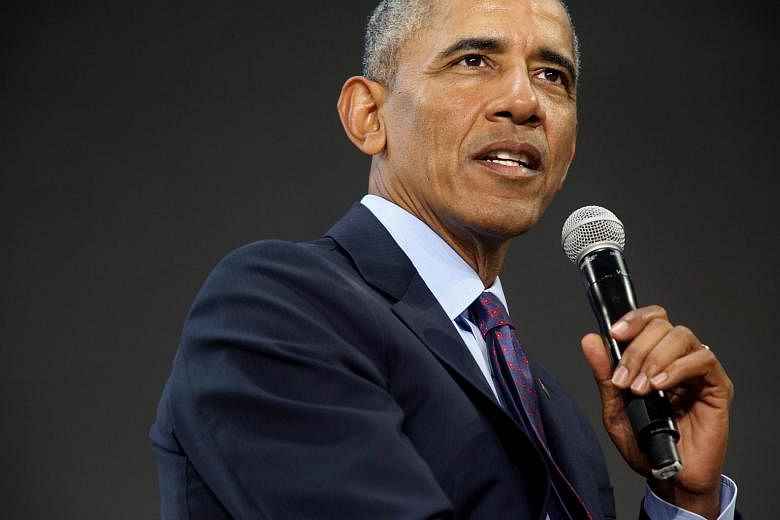SAO PAULO (NYTIMES) - Former US president Barack Obama on Thursday (Oct 5) told business leaders in Brazil that he regretted not having been able to do more to remedy the deeply polarised politics of the United States while he was in office.
Mr Obama did not mention his successor's name and steered clear of discussing the turbulence afflicting President Donald Trump's administration. The former president also did not bring up the Trump administration's efforts to reverse the reconciliation he negotiated with Cuba in 2014, a signature policy initiative that was hailed across Latin America.
"My biggest regret is not being able to bridge the differences that were emerging in our politics as much as I wanted," Mr Obama told an audience of about 1,000 people who each paid US$1,500 (S$2,048) to US$2,400 to hear him speak.
Mr Obama has given at least 10 paid speeches since leaving office, charging as much as US$400,000 per appearance. He has addressed audiences in Montreal, Italy and Indonesia in recent months. A spokesman declined to say how much he was paid for this speech.
His 23-minute keynote address in Sao Paulo, Brazil's financial capital, was titled "Change the World? Yes, You Can", echoing his 2008 campaign slogan, "Yes, we can".
Mr Obama made only fleeting references to the corruption scandals that have roiled Brazil in recent years, ensnarling scores of politicians and business leaders in a wide-ranging investigation. Political leaders "have to be held accountable", Mr Obama said, without elaborating.
The event, sponsored by the Spanish bank Santander and the Brazilian media conglomerates Valor and Globo, attracted mainly bankers and other business people.
For Brazilians, it was an opportunity to see a statesman who was widely admired here when he was president and whose message about overcoming political divisions resonates powerfully in a country that has endured years of upheaval.
"He's a pop star here," said Mr Fernando, an asset manager from a rival bank who declined to give his full name. "It was worth every penny."
But Ms Claudia, another attendee who declined to give her last name, said she was underwhelmed after paying a discounted rate, US$1,116. "It was a bit disappointing," she whispered. "I don't feel like he said anything new."
Public interest groups have expressed disappointment over the speed with which Mr Obama has cashed in after leaving office. A recent paid speech by Mr Obama to a Wall Street firm drew pointed scorn.
Mr Robert Weissman, the president of the Washington-based group Public Citizen, said Mr Obama's corporate speeches seemed jarring and tone deaf at the onset of the Trump era.
"With our democracy in such a crisis right now, Americans want to feel like their leaders aren't cashing in," Mr Weissman said in an interview on Thursday. "Particularly with president Obama, who displayed such a strong ethical compass, it diminishes him at a time when the country needs him not to be diminished."
Mr Obama said during Thursday's address that the pace of recovery from the economic crisis that he inherited had exacerbated divisions. "It happened slowly enough that people got frustrated and people went to their two different corners," he said. "And the anger in our politics - rather than me being able to pull it out, it increased."
Nonetheless, Mr Obama said he would continue to try to bridge that gap at home and globally with his Obama Foundation, which is largely focused on young people.
Mr Obama took part in a question-and-answer period at the end of his remarks that elicited familiar responses. One was about climate change.
"I don't mind if you want to have an argument with me that says, 'You know what, there's nothing we can do about the climate changing'," Mr Obama said. "But what I don't want to have is an argument where you say the planet is not getting warmer."
Mr Obama last visited Brazil in 2011 with the first lady, Mrs Michelle Obama, and their daughters. Two years later, the United States and Brazil hit a low point in their relationship amid revelations that the National Security Agency had eavesdropped on then president Dilma Rousseff, who abruptly postponed a state visit to Washington in response.

